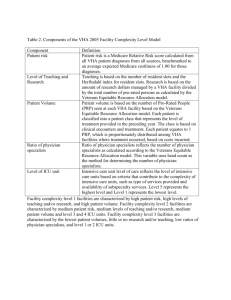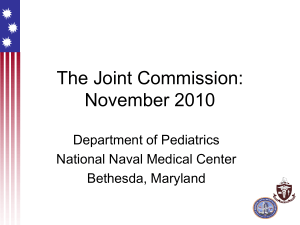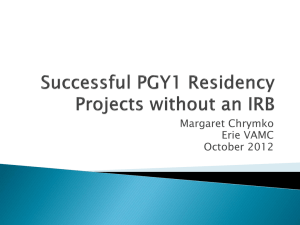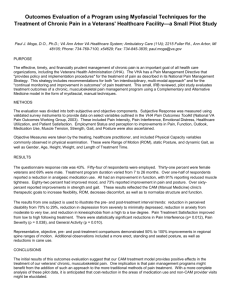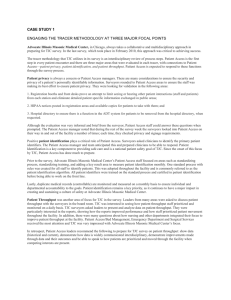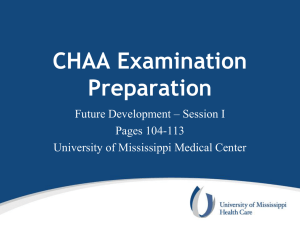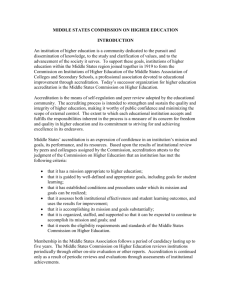VHA Handbook 1100.16, Accreditation of Veterans Health
advertisement
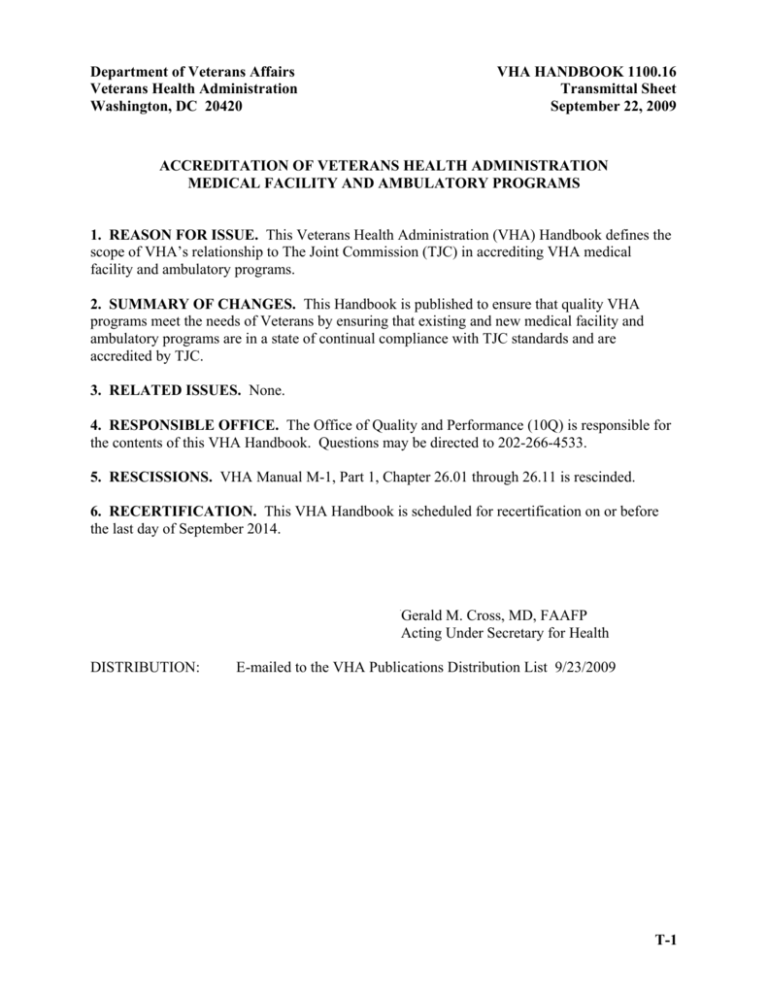
Department of Veterans Affairs Veterans Health Administration Washington, DC 20420 VHA HANDBOOK 1100.16 Transmittal Sheet September 22, 2009 ACCREDITATION OF VETERANS HEALTH ADMINISTRATION MEDICAL FACILITY AND AMBULATORY PROGRAMS 1. REASON FOR ISSUE. This Veterans Health Administration (VHA) Handbook defines the scope of VHA’s relationship to The Joint Commission (TJC) in accrediting VHA medical facility and ambulatory programs. 2. SUMMARY OF CHANGES. This Handbook is published to ensure that quality VHA programs meet the needs of Veterans by ensuring that existing and new medical facility and ambulatory programs are in a state of continual compliance with TJC standards and are accredited by TJC. 3. RELATED ISSUES. None. 4. RESPONSIBLE OFFICE. The Office of Quality and Performance (10Q) is responsible for the contents of this VHA Handbook. Questions may be directed to 202-266-4533. 5. RESCISSIONS. VHA Manual M-1, Part 1, Chapter 26.01 through 26.11 is rescinded. 6. RECERTIFICATION. This VHA Handbook is scheduled for recertification on or before the last day of September 2014. JGerald M. Cross, MD, FAAFP Acting Under Secretary for Health DISTRIBUTION: E-mailed to the VHA Publications Distribution List 9/23/2009 T-1 September 22, 2009 VHA HANDBOOK 1100.16 CONTENTS ACCREDITATION OF VETERANS HEALTH ADMINISTRATION MEDICAL FACILITY AND AMBULATORY PROGRAMS PARAGRAPH PAGE 1. Purpose ...................................................................................................................................... 1 2. Background ............................................................................................................................... 1 3. Definitions ................................................................................................................................. 2 4. Scope ......................................................................................................................................... 3 5. VHA Programs Required to Achieve and Maintain TJC Accreditation ................................... 4 6. Services Provided by TJC ......................................................................................................... 4 7. Data Use Agreements Between VHA and TJC ........................................................................ 5 8. VHA Management Regarding The Joint Commission Continual Standard Compliance and Accreditation ............................................................................................... 5 9. References ................................................................................................................................. 7 i September 22, 2009 VHA HANDBOOK 1100.16 ACCREDITATION OF VETERANS HEALTH ADMINISTRATION MEDICAL FACILITY AND AMBULATORY PROGRAMS 1. PURPOSE This Veterans Health Administration (VHA) Handbook establishes policy and responsibilities in obtaining and retaining The Joint Commission (TJC) accreditation and continual readiness with TJC standards at all VHA medical centers and ambulatory care facilities. NOTE: This Handbook is not meant to be a comprehensive listing of all accreditation requirements for specific clinical programs. For the exact accreditation requirements for specific clinical programs and initiatives please, refer to Directives or Handbooks for the corresponding program. 2. BACKGROUND a. VHA is committed to providing the highest standard of care for eligible Veterans who choose VHA health care. The highest standard of care means care that is consistent, compassionate, responsive, safe, and effective, and is continuously updated to remain abreast of new evidence and standards for health care delivery in both the public and private sectors. External review is an important function for ensuring that the highest standard of care is being delivered at every VHA site. b. TJC has been accrediting VHA facilities for over 30 years. TJC is an internationally accepted external validation that an organization has systems and processes in place to provide safe and quality oriented health care. Compliance with TJC standards and accreditation processes facilitates risk reduction and performance improvement by standardizing critical procedures and processes. Many VA directives and policies provide specific reference to TJC standards and accreditation for specific programs and functions (including, but not limited to, credentialing and privileging, teleradiology, health information management, environmental management, occupational safety and health, disclosure of adverse events, patient safety, and billing for services). c. In order to achieve TJC accreditation, VHA medical facility and ambulatory health care systems must focus on: (1) National Patient Safety Goals. (2) Patient-Focused Functions, including Ethics; Rights and Responsibilities; Provision of Care, Treatment, and Services; Medication Management; Surveillance, Prevention, and Control of Infection. (3) Organization Functions, including Improving Organization Performance; Leadership; Management of the Environment of Care; Management of Human Resources; and Management of Information. (4) Structures with Functions, including Medical Staff and Nursing. 1 VHA Handbook 1100.16 September 22, 2009 (5) Performance Measurement (Process and Outcomes). NOTE: For detailed information regarding these items see TJC manuals available on line at: http://vaww.oqp.med.va.gov/oqp_services/accreditation/jcaho.asp#manuals . This is an internal VA web site not available to the public. d. Accreditation not only confers recognition that health care organizations meet certain standards of quality and safety but also confers deemed compliance with the health care quality standards of payors, both public and commercial. Additionally, VHA has an active residency program, and the American College of Graduate Medical Education (ACGME) requires that health care organizations sponsoring or participating in GME programs be accredited by TJC or by another recognized body with equivalent standards (see http://www.acgme.org/acWebsite/home/home.asp ). e. Partnering with TJC benefits our Veterans. TJC’s Annual Reports on Quality and Safety present how America’s accredited hospitals perform against quality performance measures and safety goals and demonstrate measurable improvements in health care quality and patient safety among accredited hospitals. 3. DEFINITIONS a. Accreditation. Accreditation is the determination by TJC’s accrediting body that an eligible health care organization complies with applicable TJC standards. b. Accreditation Process. The Accreditation Process is a continuous process whereby health care organizations are required to demonstrate to TJC that they are providing safe, high quality of care, as determined by compliance with TJC standards, National Patient Safety Goals recommendations, and performance measurement requirements. Key components of this process are an on-site evaluation of an organization by TJC surveyors, a Periodic Performance Review, and quarterly submission of performance measurement data to TJC, as applicable. c. Competence or Competency. Competence or competency is a determination of an individual’s skills, knowledge, and capability to meet defined expectations. d. Continual Readiness. TJC expects an accredited organization to be in continuous compliance with all applicable standards. Compliance with a standard is interpreted as meeting the requirements of a standard through compliance with its element(s) of performance. e. Credentialing. Credentialing is the systematic process of screening and evaluating the qualifications of a health care practitioner including: licensure; required education; relevant training and experience; current competence; and health status. f. Extension Surveys. An extension survey is conducted at an accredited organization or at a site that is owned and operated by the organization if the accredited organization’s current accreditation is not due to expire for at least 9 months and when at least one of the conditions 2 September 22, 2009 VHA HANDBOOK 1100.16 below is met. An extension survey of an organization may be necessary if the organization has done any of the following: (1) Instituted a new service or program for which TJC has standards. (2) Offered at least 25 percent of its services at a new location or in a significantly altered physical plant. (3) Expanded its capacity to provide services by 25 percent or more, as measured by patient volume, pieces of equipment, or other relevant measures. (4) Provided a more intensive level of service. g. For-Cause Survey. TJC may perform a for-cause unannounced survey when it becomes aware of potentially serious standards compliance or patient care or safety issues, or when it has other valid reasons for surveying an accredited organization. A for-cause unannounced survey can take place at any point in an organization’s accreditation cycle. h. Medical Staff Bylaws. Regulations and rules adopted by the organized medical staff and the governing body of an organization for internal governance, defining rights and obligations of various officers, persons, or groups within the organized medical staff’s structure. i. Pull Forward or Push Back Surveys. In the 18-39 months TJC survey cycle a facility may have their cyclic survey pulled forward (survey will be done closer to the 18 months cycle time) or pushed back (survey will be done closer to the 39 months cycle time). j. Random Unannounced Survey. Approximately 5 percent of all accredited programs receive a random unannounced survey. It is generally conducted 9 to 30 months following the last full survey. k. Survey. A key component in the accreditation process, whereby a surveyor(s) conducts an on-site evaluation of an organization’s compliance with TJC standards. 4. SCOPE a. VHA’s primary premise for entering into a state of continual compliance with TJC standards is to enhance the quality of services and access for Department of Veterans Affairs (VA) beneficiaries thereby, fulfilling its statutory missions. Where a difference between VHA policy and regulations and TJC standards exists, VA medical facilities must meet the higher standard. b. The accreditation process is a complex system of related and interdependent activities. It includes pre-survey activities (e.g., application, self-assessment submission, the accreditation survey itself), post survey activities (e.g., communication of and response to survey findings), and ongoing activities (e.g., quality data submission). 3 VHA Handbook 1100.16 September 22, 2009 c. The unannounced accreditation survey cycle occurs, on average, every 3 years but may fall at anytime between 18-39 months from the last survey, with an additional 5 percent of all programs undergoing a random off-cycle survey. For-Cause Surveys can also be performed for “Quality Events,” such as complaints received by TJC or media attention directed at specific concerns with care. As a result of varying timeframes for surveys, the possibility of random surveys, and the possibility of For-Cause surveys, continual survey readiness is an absolute imperative. 5. VHA PROGRAMS REQUIRED TO ACHIEVE AND MAINTAIN TJC ACCREDITATION a. VHA programs required to achieve and maintain TJC accreditation include: (1) Hospital Care, (2) Ambulatory Care, (3) Behavioral Health Programs, (4) Home Care Programs, (5) Long Term Care Programs, (6) Opioid Treatment Programs, and (7) Consolidated Mail-out Pharmacy. b. Laboratory accreditation is mandated; however, facilities may choose to be accredited by TJC or the College of American Pathologists. c. Additional program accreditation requirements may be added per specific directives or in response to new accreditation products from TJC. 6. SERVICES PROVIDED BY TJC The national VHA Joint Commission contract outlines the following services and products that VHA purchases from TJC: a. Surveys. VHA program surveys are conducted in accordance with TJC published standards, policies, and procedures. The unannounced survey process includes random surveys, extension surveys, clarification validation surveys, quality event/For Cause surveys, and 18-39 month cyclic surveys (includes pull-forward, push-back surveys). b. Technical Assistance. A dedicated account representative from TJC will be designated for VHA to provide continuous access to and support of electronic tools (e.g., application, periodic performance review) by all VHA organizations. 4 September 22, 2009 VHA HANDBOOK 1100.16 c. Publications. TJC provides program manuals, and various electronic methodologies (e.g., Accreditation Manager Plus, electronic applications, Connect, periodic performance review, S3) to identified programs and officials. d. Annual Orientation and Summation. In the beginning of each calendar year, VHA staff and TJC staff meet to: (1) Allow the VHA staff to orient the surveyors to the programs, processes, and services of VA; and (2) Receive TJC’s review of aggregate data trends from the pervious year’s survey. e. Survey Notification System. TJC provides an electronic survey notification system to validate that people presenting themselves as surveyors are not imposters and that a survey is taking place. In the event that the computer system is inoperable, the contingency plan in place is to call TJC account representative directly to verify the surveyor and that a survey is taking place. f. Fees. The national VHA Joint Commission Contract addresses the cost of routine program survey application fees and on site survey fees. Accordingly, field stations are relieved of responsibility for budgeting and making payment for survey costs. 7. DATA USE AGREEMENTS BETWEEN VHA AND THE JOINT COMMISSION a. TJC has signed a Business Associate Agreement (BAA) with VHA to ensure the privacy and security rules are adhered to regarding the disclosure of protected health information and electronic protected health information. Full details on the BAA can be found at: http://vaww.oqp.med.va.gov/oqp_services/accreditation/jcaho.asp#baa. This is an internal VA web site not available to the public. b. During a TJC Survey, surveyors are not allowed access to the VHA computer system. Surveyors are not allowed to connect their TJC computer equipment to the VHA system even to access the internet. Surveyors may review electronic records from the VHA computer system only by observing a VHA staff person who is reviewing the electronic medical record at the surveyor’s request. 8. VHA MANAGEMENT REGARDING JOINT COMMISSION CONTINUAL STANDARD COMPLIANCE AND ACCREDITATION a. The Principal Deputy Under Secretary for Health. The Principal Deputy Under Secretary for Health collaborates with the Associate Deputy Under Secretary for Health for Quality and Safety and Deputy Under Secretary for Health for Operations and Management to ensure all VHA medical facilities are accredited by TJC. b. Deputy Under Secretary for Health for Operations and Management. The Deputy Under Secretary for Health for Operations and Management is responsible for: 5 VHA Handbook 1100.16 September 22, 2009 (1) The operational direction and support to the VISNs necessary to implement a continuous readiness program; and (2) Ensuring that health care operations within VHA support continuous compliance with TJC standards. c. Associate Deputy Under Secretary For Health for Quality and Safety. The Associate Deputy Under Secretary For Health for Quality and Safety is responsible for: (1) Oversight of programs under the Office of Quality and Performance (OQP) and the National Center for Patient Safety (NCPS), including OQP’s initiatives in supporting accreditation of clinical programs by TJC. (2) Communicating information related to accreditation of VA medical facilities to senior VHA leadership. d. Chief Quality and Performance Officer. The Chief Quality and Performance Officer is responsible for: (1) Collaborating with other Chief Officers, the Deputy Under Secretary for Health for Operations and Management, Veterans Integrated Service Network (VISN) Directors, and clinical leaders to ensure timely and effective transmission of and response to accreditation issues. This includes designating appropriate resources to serve as expert consultation for quality management staff at VISNs and medical centers. (2) Effectively linking accreditation standards to scientific evidence related to clinical interventions and programs. (3) Disseminating information to inform the field and VACO programs of accreditation standards changes, and corporate trends. (4) Providing a forum for discussing and resolving VHA issues with TJC. (5) Coordination and oversight of the Accreditation Program. e. Veterans Integrated Service Network (VISN) Director. The VISN Director is responsible for ensuring all VHA medical facilities within the respective VISN are accredited by TJC. To that end, the VISN Director is responsible for: (1) Ensuring VISN-wide continuous readiness with TJC standards. (2) Designating a VISN Continuous Readiness liaison. (3) Oversight of continual compliance with TJC standards through implementation of a VISN-wide continuous readiness program. 6 September 22, 2009 VHA HANDBOOK 1100.16 (4) Disseminating VHA-TJC information, such as availability of publications, changes in Joint Commission policies, etc. (5) Oversight of the VHA Continuous Readiness contract services for the respective VISN. f. Facility Director. Each facility Director is responsible for ensuring the facility is accredited and for oversight of continual compliance with TJC standards and accreditation procedures. This includes: (1) Designating an employee to serve as the facility continual readiness point of contact. This employee must stay apprised of evolving TJC standards and provide the Director with ongoing feedback about the facility’s state of readiness. (2) Oversight of continual compliance with the TJC standards and accreditation procedures. (3) Coordinating the professional activities required by TJC standards. (4) Oversight of the Professional Standards Board and credentialing and privileging activities of the medical staff in accordance with VHA Handbook 1100.19. NOTE: VHA will implement, by separate directive, a template for medical facility Medical Staff Bylaws. 9. REFERENCES a. Title 38 Code of Federal Regulations (CFR) Part 46. b. VHA/ Business Associate Agreement at: http://vaww.oqp.med.va.gov/oqp_services/accreditation/jcaho.asp#baa . NOTE: This is an internal VA web site not available to the public. c. VHA Handbook 1100.19, Credentialing and Privileging. d. The Joint Commission Comprehensive Accreditation Manual for Hospitals: The Official Handbook (CAMH) at: http://vaww.oqp.med.va.gov/oqp_services/accreditation/jcaho.asp#manuals. NOTE: This is an internal VA web site not available to the public. e. The Joint Commission Comprehensive Accreditation Manual for Ambulatory Care at: http://vaww.oqp.med.va.gov/oqp_services/accreditation/jcaho.asp#manuals. NOTE: This is an internal VA web site not available to the public. f. The Joint Commission, One Renaissance Blvd., Oakbrook Terrace, IL 60181, (630) 7925000 or http://www.jointcommission.org/. g. American College of Graduate Medical Education (ACGME) website at http://www.acgme.org/acWebsite/home/home.asp . 7
